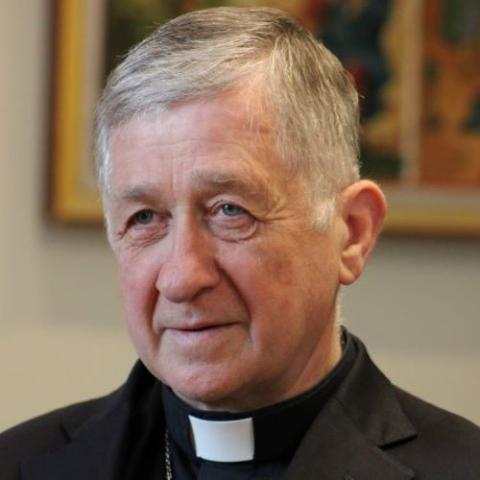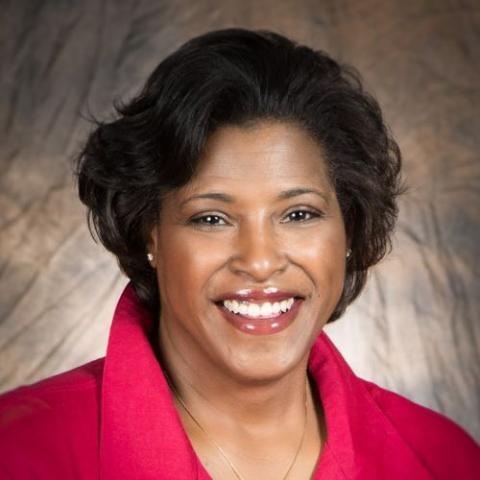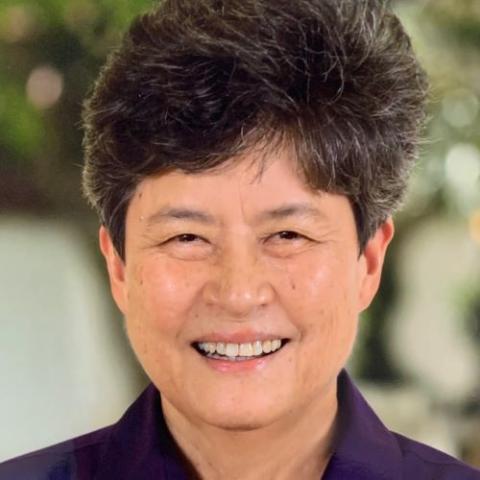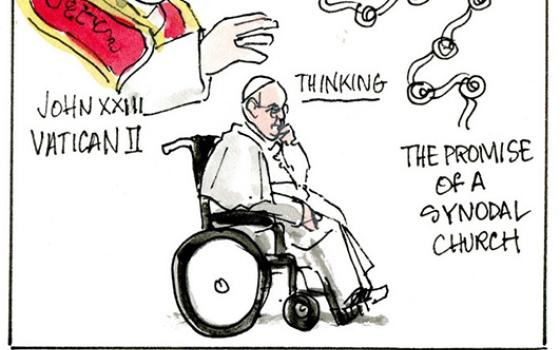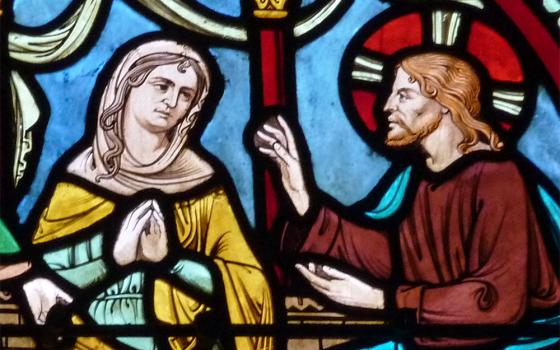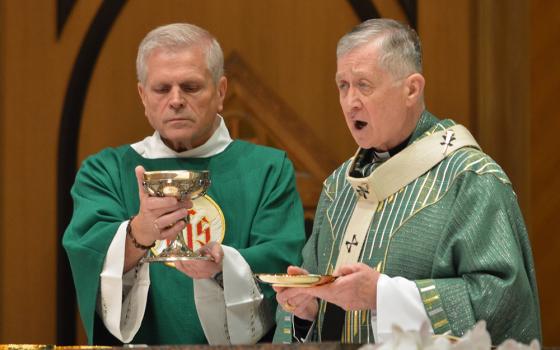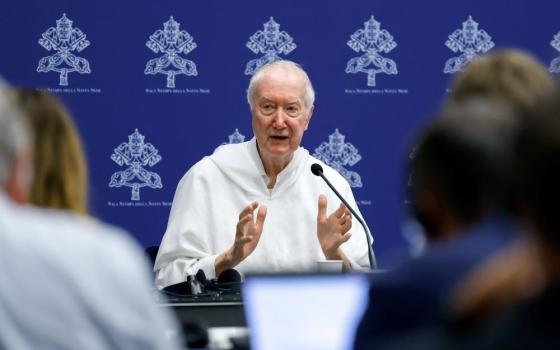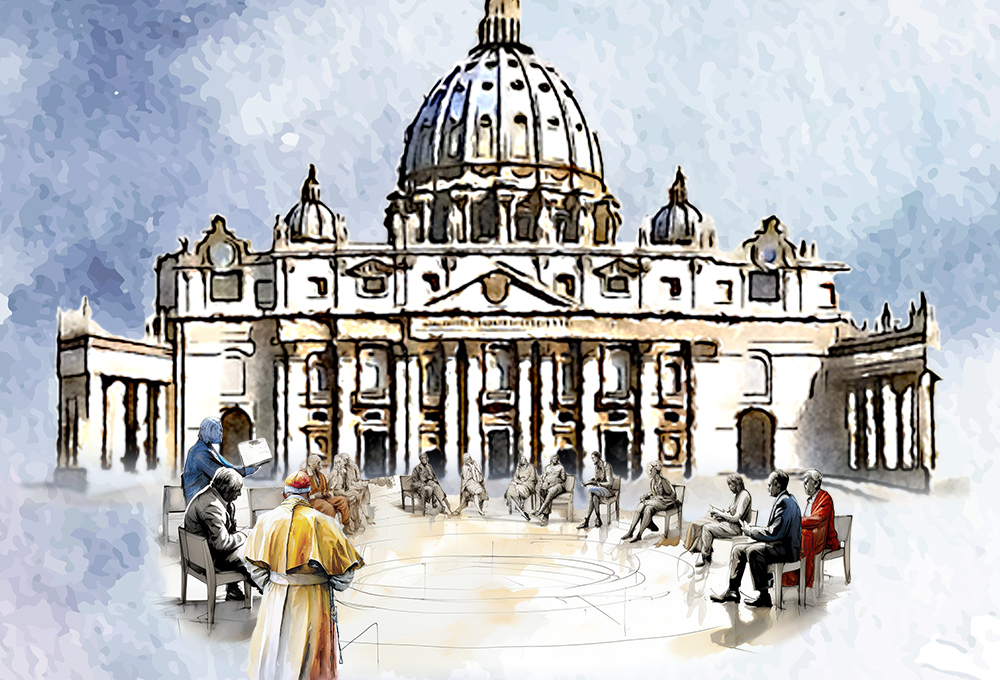
(NCR digital illustration/Toni-Ann Ortiz)
When Pope Francis opens the first of two meetings of the synod on synodality Oct. 4 in Rome, the 363 voting participants will come from all over the world. For the first time, lay people — including 54 women — will have voting rights. More than a quarter of the voting members are not bishops.
NCR has compiled a reference guide to the 24 Americans (or people with U.S. connections) who will be participating in the Oct. 4-29 synod. All participants — including appointed and ex-officio members — except experts/facilitators will be able to vote.
They include 14 bishops and 9 non-episcopal members. (An 11th non-episcopal member, Richard Coll, executive director of the Department of Justice, Peace and Human Development for the U.S. bishops' conference in Washington, D.C., is unable to attend the synod.) Some bishops are attending as representatives of the U.S bishops' conference, while others, including all five U.S. cardinals, were appointed by Pope Francis to attend. The non-episcopal attendees include priests, religious women, a brother, lay ministers and two college students.
Here are brief profiles of each, with their recent comments about synodality.
Bishop Robert Barron
U.S. bishops' conference representative
Bishop Robert Barron of Winona-Rochester, Minnesota, is better known as the founder and head of Word on Fire, a massive media ministry that reaches millions of people a year. Barron has been criticized for an overly apologetic approach to evangelization and for partnering with controversial figures such as Jordan Peterson.
In an essay titled, "As I Leave for the Synod on Synodality," Barron expressed concern about how the gathering might consider the issue of those who feel alienated from the church.
Bishop Robert Barron of Winona-Rochester, Minn., and founder of the Catholic media ministry Word on Fire (CNS/Courtesy of Word on Fire Catholic Ministries/Clare LoCoco)
"Now, addressing feelings of alienation and trying to make the Church as welcoming as possible is always a legitimate pastoral concern," he wrote. Yet, he added, "feelings, however intense, do not in themselves constitute a theological argument."
Ordained in 1986 for the Chicago Archdiocese, Barron served as rector/president of Mundelein Seminary before being named auxiliary bishop of the Los Angeles Archdiocese in 2015. His media ministry found national prominence in 2011 after the 10-part video documentary series "Catholicism," which aired on PBS.
Archbishop Timothy Broglio
U.S. bishops' conference representative
Archbishop Timothy Broglio has been head of the Archdiocese for Military Services since 2007 and was elected president of the U.S. bishops' conference in November 2022. At his first meeting as U.S. bishops' conference president, the topic of synodality was initially not on the agenda, although a report by Bishop Daniel Flores of Brownsville, Texas, was later added.
Archbishop Timothy Broglio of the U.S. Archdiocese for the Military Services is president of the U.S. Conference of Catholic Bishops. (CNS/Bob Roller)
More recently, Broglio has said he hopes the synod might counter polarization in the U.S.: "I think the emphasis that's been placed on listening will be a great help if people enter into these moments of conversation and dialogue and discernment with a spirit of listening to the other."
Ordained for the Cleveland Diocese in 1977, he has served in church diplomatic positions in the Dominican Republic, Puerto Rico, Paraguay and Ivory Coast. In the 1990s, he was private secretary to Cardinal Angelo Sodano, the secretary of state under Pope John Paul II known for his lack of response to clergy sex abuse, including by then-Fr. Marciel Maciel of the Legionaries of Christ.
Broglio has blamed homosexuality for the clergy sex abuse and backed vaccine exemptions for military members on religious objection grounds.
Sr. Maria Cimperman, RSCJ
Expert/facilitator
Religious of the Sacred Heart of Jesus Sr. Maria Cimperman is a professor of Catholic theological ethics and of consecrated life at Catholic Theologian Union in Chicago and was founding director of its Center for the Study of Consecrated Life. In addition to serving as an expert/facilitator at the synod, she was recently tapped to coordinate a new initiative to support members of the International Union of Superiors General (UISG) in living a synodal commitment.
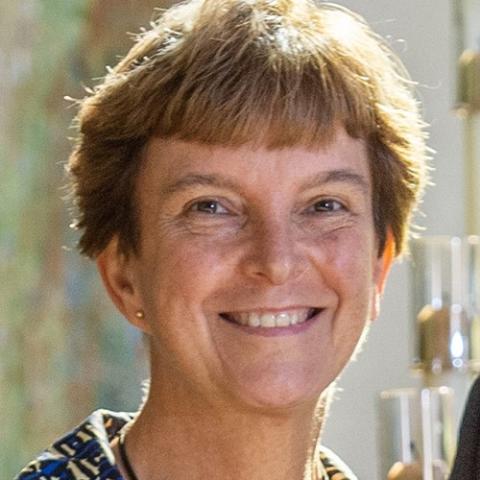
Religious of the Sacred Heart of Jesus Sr. Maria Cimperman
Cimperman has said the synod will require "renewing mentalities, attitudes, practices and structures" so that the church can "be more faithful to her vocation."
Pope Francis is "trying to help us see synodality as the church's ordinary way of proceeding rather than simply reserved for large decisions in the church's body. The pope is trying to help the church experience a way of walking together and in which the people listen and are heard," she said.
Cimperman's doctorate in theological ethics is from Boston College. She is the author of three books: When God's People Have HIV/AIDS: An Approach to Ethics, Social Analysis for the 21st Century: Faith and Action Toward a Socially Conscious Spirituality and Religious Life for Our World: Creating Communities of Hope.
Cardinal Blase Cupich
Pontifical appointment
Chicago Cardinal Blase Cupich leads the U.S.'s third-largest diocese (Los Angeles and New York are first and second, respectively). In addition, he has appointments to two Vatican offices: the Dicastery for Bishops and the Dicastery for Divine Worship and the Discipline of the Sacraments.
He — along with Cardinal Robert McElroy, Cardinal Joseph Tobin, Cardinal Sean O'Malley and others — is often seen as one of Pope Francis' key U.S. allies.
In a recent column in the archdiocesan newspaper, Cupich urged Catholics not to fear the synod, saying that while the word is new, it speaks to an "ancient reality" in line with the vision of his predecessors and the Second Vatican Council.
Cupich also countered critics of the synod, saying "modern day 'prophets of doom' totally mischaracterize the aim of the synod on synodality."
Ordained a priest for the Omaha Archdiocese in 1975, Cupich served as bishop of Rapid City, South Dakota, and Spokane, Washington, before his appointment as archbishop of Chicago in 2014. He was elevated to cardinal in 2016 by Pope Francis.
New York Cardinal Timothy Dolan delivers the homily during a Mass to mark the 150th anniversary of St Patrick's Cathedral in Armagh, Ireland, Aug. 27. (OSV News/St. Patrick's Cathedral/Liam McArdle)
Cardinal Timothy Dolan
U.S. bishops' conference representative
New York Cardinal Timothy Dolan is a former president of the U.S. bishops' conference and current chair of its Committee for Religious Liberty. He came under fire in 2020 for calling then-President Donald Trump a "great gentleman" and a "great friend" during a phone call with religious leaders.
In a 2021 message announcing archdiocesan listening sessions for the synod on synodality, Dolan noted, "The Pope has made it clear that this is not meant to discuss what the Church teaches or believes, as that is unchangeable; it is meant to discuss how the Church teaches its truths, and lives out its beliefs."
Dolan also was reportedly one of 13 cardinals who wrote to Pope Francis in 2015, expressing a lack of confidence in the management of the Synod on the Family.
Ordained to the priesthood in 1976, he served as an auxiliary bishop in St. Louis and archbishop of Milwaukee before being tapped to lead the New York Archdiocese in 2009. He was made a cardinal in 2012 and participated in the conclave that elected Pope Francis in 2013.
Archbishop Paul Etienne
Pontifical appointment
Seattle Archbishop Paul Etienne recently traveled to Japan with Archbishop John Wester of Santa Fe, New Mexico, on a "pilgrimage of peace" to promote global nuclear disarmament. In 2021, he went on the record as having voted against the U.S. bishops' proposal to deny Communion to pro-choice politicians, saying it had become politicized.
Archbishop Paul Etienne of Seattle (CNS/Paul Haring)
Etienne said the North American synod participants, who met outside Chicago in late August, used the preparatory meeting to practice "deep listening" with one another. "As the Synod document says, the main protagonist of the Synod is the Holy Spirit, meaning that while we are listening to one another, it is through this that we primarily listen to hear what the Holy Spirit is saying to the Church today," Etienne wrote on his blog.
Ordained in 1992 for the Indianapolis Archdiocese, Etienne served as bishop of Cheyenne, Wyoming, and Anchorage, Alaska, before being appointed to Seattle in 2019 by Pope Francis. He faced criticism last year for moving from a rectory into a $2.4 million home in an upscale waterfront neighborhood.
Cardinal Kevin Farrell
Representative from Roman Curia
Irish-born Cardinal Kevin Farrell, the prefect of the Vatican Dicastery for the Laity, the Family and Life, was ordained a priest for the Legionaries of Christ but later was incardinated in the Archdiocese of Washington, D.C. He served as an auxiliary bishop in the Washington Archdiocese before being named bishop of Dallas in 2007.
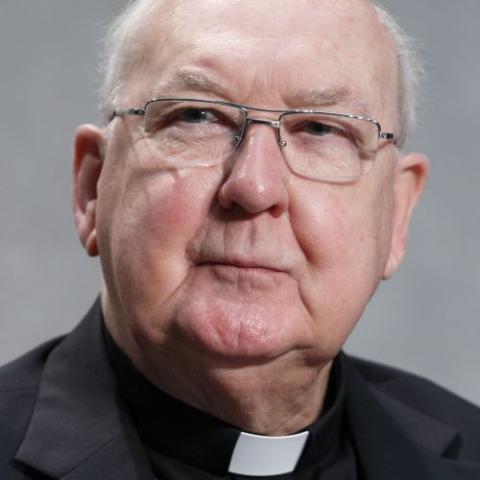
Cardinal Kevin Farrell, prefect of the Dicastery for Laity, the Family and Life, attends a news conference at the Vatican in this May 10, 2022, file photo. (CNS/Paul Haring)
At a February conference on synodality, Farrell said ordained and lay people are equally responsible for the life of the church and that a first step in building a synodal church is for pastors to stop seeing lay people as those they "delegate" to fulfill certain tasks.
"We must go to a much deeper understanding of what it means to be co-responsible for the life of the church," he said, adding that as baptized Catholics, "we are all responsible for the church."
Farrell's current Vatican positions also include serving as president of the Commission for Confidential Matters and as camerlengo, the cardinal who is the interim leader of the Vatican City-state after the death or resignation of a pope.
Bishop Daniel Flores
Delegate president, U.S. bishops' conference representative
Bishop Daniel Flores of Brownsville, Texas, will not only represent the U.S. bishops' conference at the synod but also is among nine appointed "delegate presidents" who were part of the preparatory commission. They will preside over the meeting on behalf of the pope, who is the synod's president.
Bishop Daniel Flores of Brownsville, Texas (CNS/Robert Duncan)
Flores has said he hopes the synod is an opportunity for the church to better listen to lay people: "If we do this right … in our own local churches we can develop a style of listening and decision-making that involves more hearing from people 'in the trenches,' so to speak."
Ordained for the Diocese of Corpus Christi, Texas, in 1988, Flores was named bishop of Brownsville in 2010, after three years as an auxiliary bishop of Detroit. He is the chair of the U.S. bishops' Committee on Doctrine, which earlier this year released a controversial document prohibiting Catholic health care institutions from providing gender-affirming medical care to transgender patients.
A Mexican American, Flores posts regularly, in English and Spanish, on "X," formerly known as Twitter, under the handle "Amigo de Frodo."
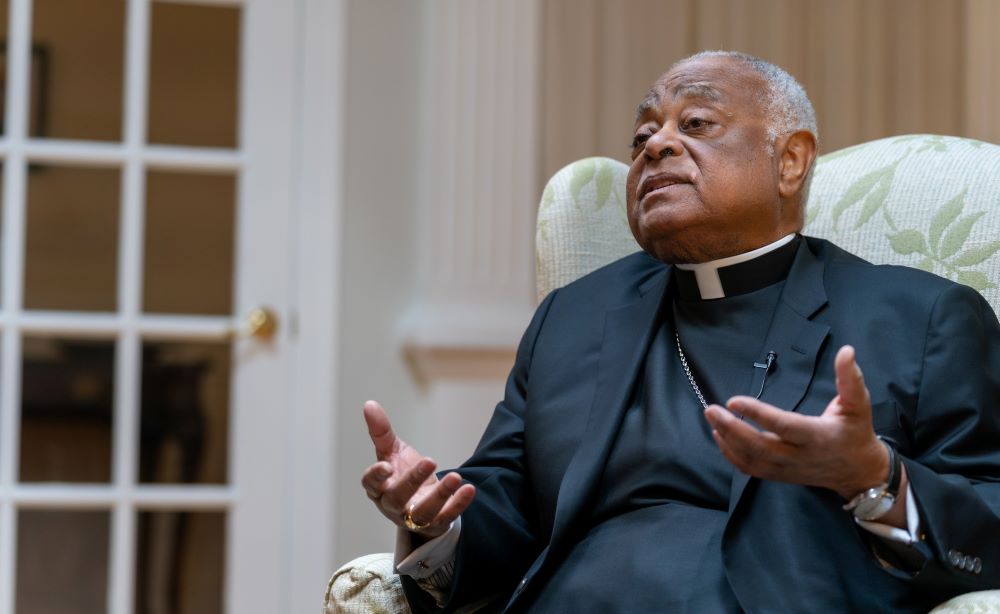
Cardinal Wilton Gregory, the archbishop of Washington, speaks during a May 2023 interview with the Catholic Standard and El Pregonero newspapers. (OSV News/Catholic Standard/Mihoko Owada)
Cardinal Wilton Gregory
Pontifical appointment
During Washington Cardinal Wilton Gregory's tenure as president of the U.S. bishops' conference in the early 2000s, the bishops implemented the Charter for the Protection of Children and Young People, often referred to as the "Dallas Charter."
The first African American cardinal, Gregory currently serves as a member of the Vatican Dicastery for the Laity, Family and Life and on the board for the Papal Foundation.
At a Mass opening the archdiocesan phase of the synod in 2021, Gregory said that every member of the church must feel invited to participate in the synodal process. "We should be inspired to speak honestly with one another and to listen sincerely to those voices that might challenge or even confuse us," Gregory said. "We must not be afraid to hear the voices of those who may feel distant from the Church or those who have grown frustrated or scandalized by our past."
Ordained a priest for the Chicago Archdiocese in 1973, Gregory served as an auxiliary bishop there before being named bishop of Belleville, Illinois, then archbishop of Atlanta. After being appointed archbishop of Washington D.C. in 2019, he was elevated to cardinal in 2020.
Br. Mark Hilton, SC
Union of Superiors General representative
Br. Mark Hilton is superior general of the Brothers of the Sacred Heart. Born in Australia, he transferred to the New England Province in the United States when the order left Australia and later served as provincial in the U.S.
Hilton has said that he hopes that the synod is an opportunity to learn from experience and "from the wonder of our encounters."
"External rules and structures may aid the church, but they will not create the fire at its core necessary for that divine life to pull forth in mission to all," he said.
Hilton also hopes humility marks the synodal process. "I do not think I have an answer about how the synod will unfold, how communion will be achieved," he said. "We may not solve the great theological questions, but maybe, just maybe, when those around us know and feel that they are deeply beloved, the Spirit may have its own freedom among us."
Most of Hilton's ministry has been in education, as a teacher, campus minister and principal, before assuming leadership in the order.
Cynthia Bailey Manns
Non-episcopal pontifical appointment
Cynthia Bailey Manns is adult learning director at St. Joan of Arc Parish in Minneapolis, a progressive "destination" parish known for its welcoming culture. She also is a member of the archdiocesan lay advisory board.
She has said that she believes that the synod is "a conversation that could lead to changes," while acknowledging that the process may be "messy" and take patience.
Bailey Manns said she hopes to bring the concerns of the marginalized to the synod, including members of the Black and LGBTQ+ communities, the economically oppressed, women in the church and those concerned about caring for the Earth.
"The challenge for us is to get out of the way and let the Holy Spirit do what it does so well," she told her archdiocesan newspaper. "I expect there will be a lot of lives changed at the end of the process. I hope I will come out different, too."
Bailey Manns has taught at St. Catherine's University in St. Paul and United Theological Seminary of the Twin Cities. She contributed to the anthology, Embodied Spirits: Stories of Spiritual Directors of Color, and is active in Discerning Deacons, which supports the restoration of women to the diaconate.
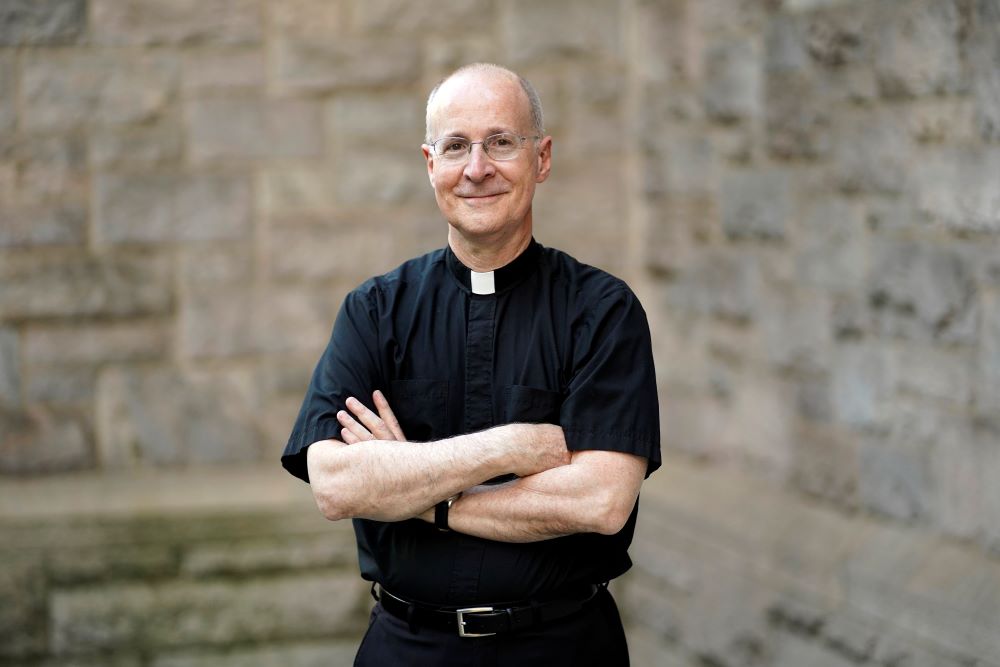
Jesuit Fr. James Martin, author and editor at large at America Media, poses for a photo June 25, 2022, after celebrating a Mass at St. Paul the Apostle Church in New York City for participants of the Outreach LGBTQ Catholic Ministry Conference. (CNS/Gregory A. Shemitz)
Fr. James Martin, SJ
Non-episcopal pontifical appointment
Perhaps the most controversial delegate from the United States — if not the most controversial overall — is the Jesuit priest and author, Fr. James Martin, who is known for his ministry to and on behalf of LGBTQ Catholics.
Martin is editor-at-large at America magazine and editor of its Outreach website for LGBTQ Catholics. Among his many books is Building a Bridge: How the Catholic Church and the LGBT Community Can Enter into a Relationship of Respect, Compassion, and Sensitivity.
At a recent webinar on "The Synod and LGBTQ+ Issues," sponsored by New Ways Ministry, Martin said, "I do promise to be your voice at the synod ... at least in part to be the voice of LGBTQ Catholics as much as I can, when I can."
Martin graduated from the University of Pennsylvania's Wharton School of Business and worked in corporate finance for several years before entering the Jesuits. He was ordained in 1999. He has commented on religion and spirituality in the national and international media, including regular appearances on the "The Colbert Report." He has more than a million followers across social media platforms.
Fr. David McCallum, SJ
Expert/facilitator
Jesuit Fr. David McCallum is founding executive director of the Rome-based Program for Discerning Leadership, a special project of the International Association of Jesuit Universities. The program prepares participants for leadership in a synodal church, with spiritual practices from the Catholic faith and temporal tools from the disciplines of management and business.
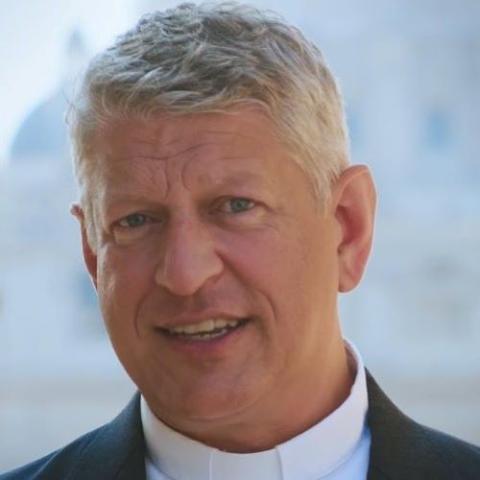
Jesuit Fr. David McCallum, executive director of the Program for Discerning Leadership (CNS/Courtesy Discerning Leadership)
"We want to foster leadership that is rooted in the gospel and the way that Jesus demonstrates on how to use power and authority rather than fixated on the way in which the world tends to see these things," McCallum told NCR.
He also noted that "synodality feels very challenging for those who are more comfortable with the patriarchal, hierarchical mode of control and authority."
Ordained in 2001, McCallum formerly served as vice president for mission integration and development at Le Moyne College in Syracuse, New York. He also was a co-founder of Contemplative Leaders in Action, a leadership development program for young professionals. He presents workshops and retreats and consults on organizational change and mission integration projects in the U.S. and internationally.
Cardinal Robert McElroy
Pontifical appointment
San Diego Cardinal Robert McElroy has already made waves with public comments about the future of the Catholic Church, calling for "radical inclusion" and reform of the church's "structures and cultures of exclusion" in an essay in America magazine. The essay prompted criticism from conservative Catholics, including one bishop who suggested that the cardinal was a heretic.
Cardinal Robert McElroy of San Diego. (CNS/Chris Warde-Jones)
McElroy also has publicly criticized the conservative media conglomerate EWTN and said the San Diego Diocese would not publish its content.
The cardinal has repeatedly said that the synod is a "call to conversion" and a "call to reform within the life of the church."
"Pope Francis has called the whole of the church to a profound process of renewal through a synodal process that seeks to touch and transform every element of our ecclesial life and our outreach to the world," he said.
A California native, McElroy was ordained for the San Francisco Archdiocese in 1980 after studying at Harvard and Stanford. (He also has earned two doctorates.) He served as vicar general and as an auxiliary bishop in San Francisco before being named to San Diego in 2015. In 2022, Pope Francis elevated him to cardinal.
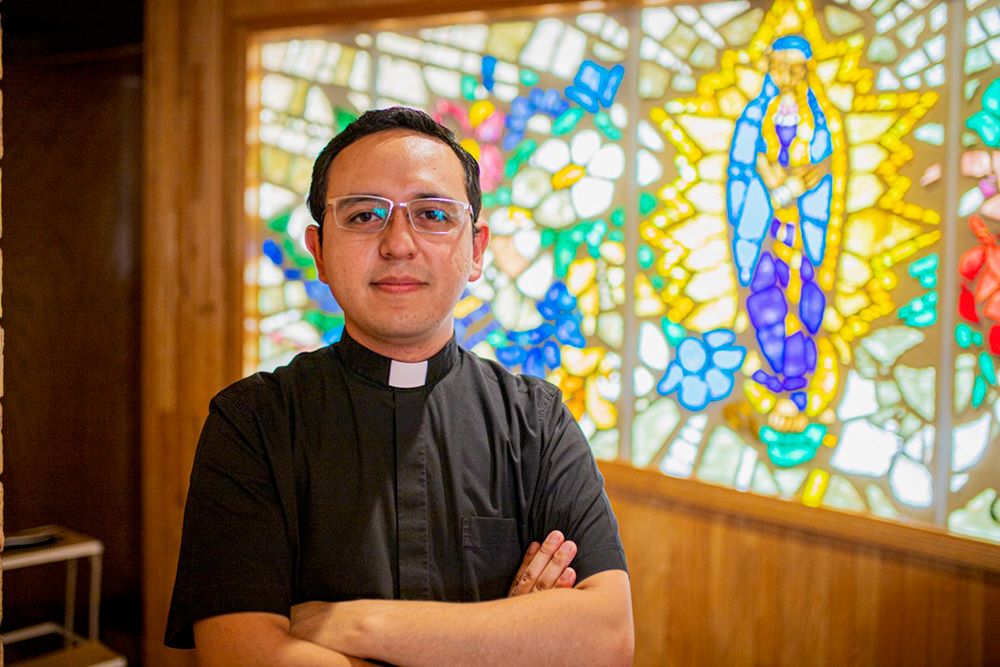
Fr. Iván Montelongo, an immigrant from Chihuahua, Mexico, was the coordinator for the synod on synodality in the diocese of El Paso, Texas. He also serves as the diocesan vocation director and was recently named its judicial vicar, overseeing the marriage tribunal. (Courtesy of Iván Montelongo)
Fr. Iván Montelongo
Non-episcopal pontifical appointment
Fr. Iván Montelongo was the coordinator for the synod on synodality in the diocese of El Paso, Texas. He also serves as the diocesan vocation director and was recently named its judicial vicar, overseeing the marriage tribunal.
An immigrant from Chihuahua, Mexico, Montelongo told NCR he believes the synod should prioritize the marginalized and those on the peripheries, including those who have drifted away from the church, the divorced and remarried, migrants and members of the LGBTQ community.
"I don't want to come with an agenda," the priest said. "I want to listen to the people, and I want to be open to the Spirit."
Ordained by El Paso Bishop Mark Seitz of El Paso in 2020, Montelongo is a graduate of Mundelein Seminary in Illinois and has a canon law degree from the Catholic University of America in Washington, D.C. Montelongo was part of a recent delegation of community organizers from the West/Southwest Industrial Areas Foundation to meet with Pope Francis.
Wyatt Olivas
Non-episcopal pontifical appointment
Wyatt Olivas is a student at the University of Wyoming in Laramie, where he is studying music education. He attends St. Paul's Newman Center, where he is a music minister and works with high school parishioners. He is one of the youth representatives on the Cheyenne Diocese's Pastoral Council.
Olivas believes the synod is especially important for young Latinos, who recent studies suggest could make up more than half of U.S. Catholics under 30.
"It hurts our feelings when people don't want to listen to us and when people push us aside and make us 'tomorrow's church' and not part of our universal church," Olivas said. "The youth feel pushed aside and not getting bigger responsibilities because it's not 'their turn.' "
Olivas is from Cheyenne, where he attended St. Joseph Parish. He served as a music minister and catechist there, teaching third graders and assisting with confirmation classes. This past summer, he served as a missionary with the Catholic youth evangelization program Totus Tuus.
Cardinal Sean O'Malley
Pontifical appointment
Boston Cardinal Sean O'Malley has served on Pope Francis' closest advisory group, the nine-member Council of Cardinals, since 2013. He also has headed the Vatican's Pontifical Commission for the Protection of Minors since it was formed in 2014.
A Capuchin Franciscan, O'Malley is often seen wearing the distinctive brown habit of the order.
At the opening Mass for the diocesan phase of the synod in 2021, O'Malley said a synod is not a convention nor session of government but rather "a grace-filled event, a process of healing guided by the Spirit."
"At a time of such divisions and polarization in our country and the world, the Holy Father is inviting us to join together on a synodal way, where together we can help discover God's will for us," the cardinal said.
O'Malley has headed the Boston Archdiocese since 2003, after episcopates in St. Thomas, Virgin Islands, Fall River, Massachusetts, and Palm Beach, Florida. He was the first cardinal in the world to launch a personal blog and still posts regularly at cardinalseanblog.org.
Julia Osęka
Non-episcopal pontifical appointment
Julia Osęka is an international student from Poland attending St. Joseph's University in Philadelphia, where she is studying physics and theology. She also is a peer minister in the university's campus ministry.
Osęka had been active in the Synodality in Catholic Higher Education in the Archdiocese of Philadelphia (SCHEAP) program, a coalition of Catholic colleges, universities and Newman Centers in Philadelphia that held listening sessions and sought to involve students in the synod process.
Osęka praised the meetups and said she hoped they would continue. "What are my hopes? That our smaller communities will continue to gather — not only gather and talk about the Church but also in different fields," she said. "The conversations on campus show that young people want to be involved, that people care about their spirituality."
Osęka is the only female physics scholar in the university's prestigious John P. McNulty Program, which awards scholarships to women in STEM. She also completed a research project on how the Jewish community in her hometown of Sobienie-Jeziory was decimated in the Shoah.
Sr. Mary Angela Perez, RSM
Non-episcopal pontifical appointment
Mercy Sr. Mary Angela Perez of Guam is part of the synod delegation from Oceania appointed by Pope Francis. Perez is past president and principal of the Academy of Our Lady, a Catholic girl's high school in Guam, and currently serves as its director of mission effectiveness.
Perez served on the Archdiocese of Agaña's synod core planning group. In its summary after local listening sessions in 2022, the group said they heard concern about challenges to the "family spirit" of the church, "especially when some church members are made to feel like outsiders." Others at the listening sessions said polarization and the need to better reach young people were priorities.
In addition to her work in education, Perez has fought for the rights, fair compensation and housing of migrant workers, especially teachers hired from foreign countries. She also represents religious sisters of Guam as part of the archdiocesan curia.
Cardinal-designate Robert Prevost
Representative from Roman curia
Cardinal-designate Robert Prevost took over as head of the influential Vatican Dicastery for Bishops in April after serving as a member of the office for three years. He will be made a cardinal at the Sept. 30 consistory.
He has noted that it is not a coincidence that Pope Francis will hold the consistory just before the first session of the synod.
"All of us are called to walk together," which requires us "to truly search for the will of God and the presence of the spirit listening to one another and carry on this mission of service and love that is so central to the very meaning of what Church is about," Prevost told Vatican News.
Born in Chicago, he was ordained as an Augustinian priest in 1982 and has served as provincial and prior general for the order. Much of his ministry has been in Peru; he was named bishop of Chiclayo in 2015.
Bishop Kevin Rhoades
U.S. bishops' conference representative
Bishop Kevin Rhoades of Fort Wayne-South Bend, Indiana, is chair-elect of the U.S. bishops' Committee on Religious Liberty. He also serves on the bishops' advisory board for the National Eucharistic Revival and on the boards for the Theology of the Body Institute and the Augustine Institute.
Rhoades said he would like to see a more "Christological approach" during the synod. "A lot is about the Holy Spirit, but we have to be careful that discernment is done well. Is this really of the Holy Spirit?" he said in a podcast. "I would like to see … more of Christ and his teaching as the foundation. In the present [synod] documents that's presumed, but I think it should be more explicit."
Rhoades has occasionally clashed with the University of Notre Dame, which is located in his diocese. He condemned a recent speaker series on abortion and transgender issues, disagreed with the inclusion of contraceptives on university insurance plans and criticized the university's decision to honor then-Vice President Joe Biden.
Ordained in 1983 as a priest for the Diocese of Harrisburg, Pennsylvania, Rhoades became that diocese's bishop in 2004. Five years later he was appointed to the Fort Wayne-South Bend Diocese.
Advertisement
Sr. Leticia Salazar, ODN
Non-episcopal pontifical appointment
Sr. Leticia Salazar is a member of the order of the Company of Mary Our Lady and serves as chancellor of the Diocese of San Bernardino, California.
Salazar, who began as chancellor just as the synod process began, said she has found the process personally transformative, discovering through the diocesan listening sessions that "the Holy Spirit is calling us back to the basics."
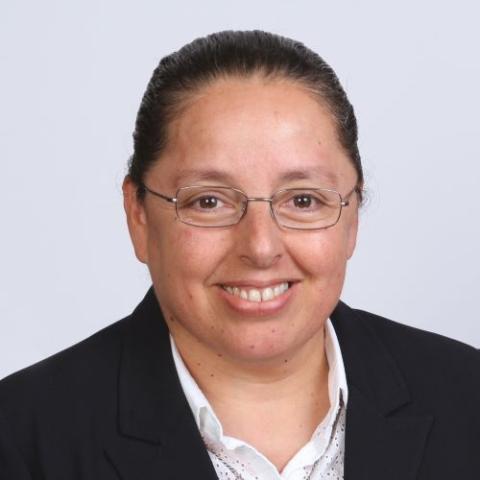
Sr. Leticia Salazar (Courtesy of Leticia Salazar)
She also has compared the synod process to Encuentros in the Latin American Catholic community. "There is a need for all of us to listen, from one culture to another. This is the next step the Holy Spirit is calling us to," she said. "The Holy Spirit is also working in other realities. The point is not to ask for permission to be a church. We are a church. But the Holy Spirit is always calling us to do more."
Salazar previously served as director of Hispanic ministry and director of the Institute for Pastoral Ministry for the Diocese of Orange, California. An immigrant from Mexico, she served as provincial superior of her religious community's U.S. province for seven years and is currently a member of her community's leadership team for the Province of the Pacific.
Archbishop William Skurla
Ex-officio member
Archbishop William Skurla of the Archeparchy of Pittsburgh will represent the U.S. Byzantine Catholic (Ruthenian Greek) Metropolitan Church at the synod. This will be Skurla's third synod, having attended the Synod on the family and the Synod on youth and young people.
He has said he hopes the Latin church can learn from the Eastern churches that synodality is a process for all voices to be heard. "It takes a wide range from the far right and the far left and brings them together," he said.
Byzantine Catholic Archbishop William Skurla of Pittsburgh (CNS/Paul Haring)
Ordained in 1987, Skurla served as bishop of the Byzantine Eparchy of Van Nuys (now Eparchy of Phoenix) and the Eparchy of Passaic, New Jersey, before being named archbishop of Pittsburgh and metropolitan of the Byzantine Church in the U.S. in 2012. He currently serves on the U.S. bishops' Administrative Committee, Priority and Plans Committee and National Advisory Committee.
Cardinal Joseph Tobin
Member of synod council
Newark, New Jersey, Cardinal Joseph Tobin will be attending the synod as part of its 16-member ordinary council, which assists the pope and the secretary-general in planning the synod. Tobin's other current Vatican appointments include membership in the Dicastery for Bishops, the Dicastery for Catholic Education, the Pontifical Council for Culture, the Pontifical Council for Promoting Christian Unity and the Council for the Economy.
Cardinal Joseph Tobin of Newark, N.J. ((CNS/Robert Duncan)
Tobin has emphasized the importance of listening at the synod: "If we want a synodal church, we need to ask ourselves if we believe that the Spirit manifests freely through all persons and their life stories, even in points of view that are completely different and diverse from our own position."
Ordained in 1978 to the Redemptorists, Tobin served in leadership for the order, including as superior general. In 2012, he was named archbishop of Indianapolis; in 2016 he became archbishop of Newark. Tobin is a member of the U.S. bishops' Committee on Migration and formerly chaired its Committee on Clergy, Consecrated Life and Vocations.
Editor's note: This story has been updated to add one synod participant.

